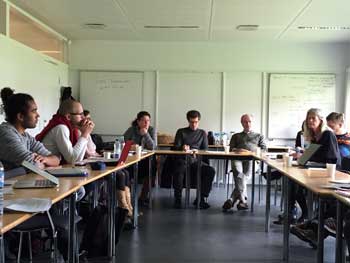In cooperation with Laura Horn and the Global Dynamic Research Cluster “Structural Adjustments come to Europe”, Transform! held a workshop on the 9th of May at the Roskilde University on European Social Movements. It aimed at bringing together social movements researchers and activists to discuss the Europeanization of the resistance against austerity and for democracy, the relation between grassroots movements and trade unions, the role of the European Left, as well as the implications of the new political momentum in Europe opened up by SYRIZA’s electoral victory.
SYRIZA has shown its ability to integrate new forms of radicalism and the aspiration for social justice and direct democracy that emerged from the Square Movement – the grassroots response to the austeritarian Memoranda of Understanding imposed upon the country by the Troika and actively implemented by local political elites. Supporting the movement without co-opting it, and actually learning from it, was one of the keys of its electoral success. The on-going harsh political confrontation over Greece’s debt is an existential threat to the neoliberal consensus, and could pave the way for a change of course in Europe. Stakes are high. What does it mean for the European actors of social transformation – be they social movements, trade unions or Left parties?
Traditionally difficult party-movement relation
As most of the participants recalled, the party-movements relation has been traditionally difficult. Parties have always tried to control the movements in order to take advantage of the social dynamics they had aroused. Although the situation is now different, notably with the anti-austerity campaign that popped up throughout Europe, other difficulties stand in the way of a broad unitary movement – such as the sometimes complex relations between social movements and trade unions. As an example, the new social movements tend to be more inclusive with precarious workers than the unions, which are confronted with “a problem of representation” against a background where labour is more and more fragmented. Moreover, their differences in terms of organisational structure may prevent a higher degree of unity to occur.
The SYRIZA strategy
SYRIZA, whose political roots reach back to the euro-communist tradition, has been open to discuss with social movements and NGOs for a very long time. As a coalition, it gathered different forces of the Left, as well as several components of the feminist and ecological movements. It has always been active on issues going beyond capital-labour opposition – just to name a few: Palestine and Western Sahara, World Social Forums, LGBT rights, environmental issues, migrant rights. This culture of dialogue allowed SYRIZA to engage in fruitful discussions with the Square Movement. The strategy was the following: “towards the electoral arena through the support of the movements” – support that the party could gain thanks to a better inclusion of their demands. Its involvement on the grassroots level is strong, as is shown by the positive implication with “Solidarity 4 All”.
A new political momentum
Now that SYRIZA won the general elections, we are witnessing a new political momentum. For the very first time, the neoliberal consensus is threatened from within the EuroGroup. This unique situation raises new challenges for the movements, understood in the broader sense of the term. Not the least of which is to build a European movement in the midst of a brutal political confrontation between Greece and the European partners and institutions, and with a Left party in power. A mass mobilisation throughout Europe to support the respect of popular sovereignty and the Greek government’s will for another change of course is highly necessary. It requires a large coalition of forces – movements, trade unions and progressive political parties – aiming at a common goal, but this is not sufficient. The key is to build coalitions operating at the national level, while – at the same time – working towards their unification at the European level. This patchwork of both organisations and levels of action is the common challenge shared by Left parties, trade unions and social movements.
Anti-TTIP campaign
In a way, the anti-TTIP campaign is achieving the completion of such a patchwork. Numerous and diverse grassroots initiatives (environmentalists, social movements, farmer organisations, etc.) united at the European level, and still benefit from the active support of trade unions and progressive political parties. The 2 millions signatures gathered by the self-organised European citizens’ initiative against TTIP demonstrates the success of such a “glocal” approach. The struggle for a new cultural and political hegemony, in constant dialogue with all the actors of social transformation, could serve as common ground for the transformative patchwork on the making.
First workshop of its kind, the idea of bringing together social movements researchers and activists proved to be successful. A discussion paper compiling the outcomes of the discussions is on the way, and the initiative will be repeated next year.
